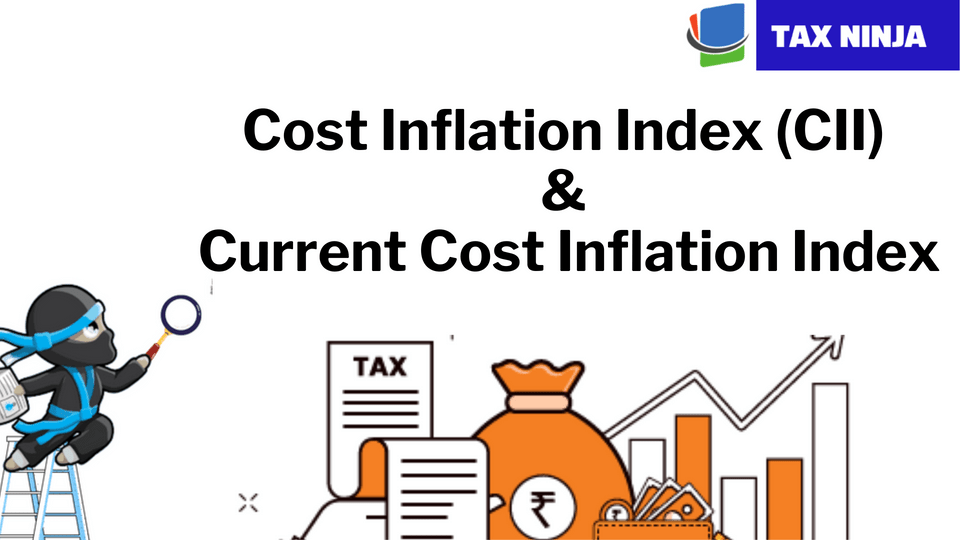

Inflation is what leads to decline of purchasing power of a currency (INR) over a period of time, which leads to rise in prices of goods and services.
For example, if you are able to buy 10 chocolates for a certain amount say Rs. 100, over a period of time you may be able to buy only 8 chocolates at the same amount of Rs. 100 due to Inflation.
Cost Inflation Index or CII is a tool to calculate the inflation-adjusted cost of asset acquisition for computation of Long Term Capital Gains of assets.
Every year, Central Government notifies the CII in official gazette under section 48 of the Income-tax Act, 1961
Section 48 of the Income-Tax Act, 1961 defines Cost Inflation Index as such Index as the Central Government may, having regard to seventy-five per cent of average rise in the [Consumer Price Index for urban non-manual employees] for the immediately preceding previous year to such previous year, by notification in the Official Gazette, specify, in this behalf.
As you might know that Capital Gains arises when there is sale or transfer of any capital assets (Land, Property, Stock, Jewellery, Drawings & Paintings, Sculptures, etc.). Now these Capital Assets are recorded at historical cost (cost price) in books of accounts. Upon sale/transfer of these assets, the profit will remain at higher end since sale price remains higher as compared to purchase price due to inflation.
Now, the indexed cost of acquisition will take into account the impact of inflation on purchase price and will result in lower profits and less taxes.
Cost Inflation Index is used to calculate:
(i) Indexed Cost of Acquisition :
Cost of Acquisition x (Cost Inflation Index for the year in which asset is transferred ÷ Cost Inflation Index for the first year in which asset was held or for the year beginning on 1-04-2001, whichever is later)
For example : If a property was purchased for Rs. 10 lakhs in the year 2001-02 and now it were to be sold for Rs. 50 lakhs in the year 2021-22, Indexed Cost of Acquisition would be Rs. 31,70,000 (Rs. 10,00,000 x 317/100) and accordingly LTCG would be Rs. 18,30,000 since the Cost Inflation Index for F.Y. 2021-22 and F.Y. 2001-02 is 317 and 100 respectively.
(ii) Indexed Cost of Improvement :
Cost of Improvement x (Cost Inflation Index for the year in which asset is transferred ÷ Cost Inflation Index for the first year in which the Improvement to asset took place)
The base year is the first year of cost inflation index bearing value 100. Now to ascertain the increase in inflation, we compare index of relevant year to base year.
And for assets purchased prior to base year, taxpayers can take Actual Cost (Cost of Acquisition) or Fair Market Value as on first day of the base year, whichever is higher, as Purchase Price, subject to other conditions. However, Cost of Improvement incurred prior to base year is to be ignored.
Initially, Base year was 1981-82 for Cost Inflation Index, however owing to hardships faced by taxpayers, the same was shifted to 2001.
Accordingly, for assets purchased prior to 01/04/2001, taxpayers can take Actual Cost (Cost of Acquisition) or Fair Market Value as on 01/04/2001, whichever is higher, as Purchase Price, subject to other conditions.
| Sl. No. | Financial Year | Cost Inflation Index |
| 1 | 2001-02 | 100 |
| 2 | 2002-03 | 105 |
| 3 | 2003-04 | 109 |
| 4 | 2004-05 | 113 |
| 5 | 2005-06 | 117 |
| 6 | 2006-07 | 122 |
| 7 | 2007-08 | 129 |
| 8 | 2008-09 | 137 |
| 9 | 2009-10 | 148 |
| 10 | 2010-11 | 167 |
| 11 | 2011-12 | 184 |
| 12 | 2012-13 | 200 |
| 13 | 2013-14 | 220 |
| 14 | 2014-15 | 240 |
| 15 | 2015-16 | 254 |
| 16 | 2016-17 | 264 |
| 17 | 2017-18 | 272 |
| 18 | 2018-19 | 280 |
| 19 | 2019-20 | 289 |
| 20 | 2020-21 | 301 |
| 21 | 2021-22 | 317 |
| 22 | 2022-23 | 331 |
| 23 | 2023-24 | 348 |